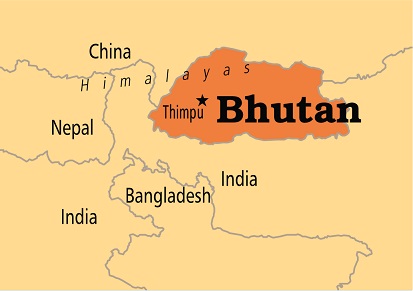International Relations
Kholongchhu Hydropower Project
- 30 Jun 2020
- 6 min read
Why in News
Recently, India and Bhutan have signed concession agreement on the 600 MW Kholongchhu Hydropower Project.
- It will be the first-ever Joint Venture (JV) project between India and Bhutan.
- The JV partners are Satluj Jal Vidyut Nigam (SJVN), and the Druk Green Power Corporation (DGPC) from India and Bhutan respectively.
Key Points
- Description:
- The Kholongchhu project is one of four additional projects agreed in 2008, as a part of India’s commitment to help Bhutan to create a total 10,000 MW of installed capacity by 2020.
- The 600 MW run-of-the-river project is located on the lower course of the Kholongchhu river in eastern Bhutan’s Trashiyangtse district.
- The project is expected to be completed in the second half of 2025.
- The project will be constructed as a 50:50 joint venture.
- Significance:
- Concession Period: The Government of India will provide, as a grant, the equity share of the Bhutanese DGPC in the JV Company. Once the project is commissioned, the JV partners will run it for 30 years, called the concession period, after which the full ownership will transfer to the Bhutan government, which will receive power from the project as a royalty.
- Bilateral Cooperation: The tapping of hydropower in Bhutan would pave a way for successful bilateral cooperation and mutual engagement between India and Bhutan.
- Strategic Interest: Being a member of BIMSTEC, Bhutan holds geostrategic importance for India. The shared sense of support and help in terms of such development projects between the two countries can help India in executing its Act East-Look East Policy.
- Energy Trade: The project would act as a milestone in generation of energy and related trade.
- The project would aid in a clean and stabilising power source for India and also contribute to its renewable energy targets.
- Employment Opportunities: Commencement of construction activities of the project will create economic and employment opportunities in Bhutan.
- India needs to focus on the youth of Bhutan, as it is the youth only, which would take the people-to-people contact forward in the future.
- Economic Growth: The plant would drive economic growth and hence socio-economic development would be facilitated in Bhutan.
- Concerns:
- Power Tariffs: The project which started in 2014 was on halt since December 2016 over India’s new power tariff guidelines on Cross Border Trade of Electricity - CBTE, until the government amended its guidelines after negotiations with the Bhutan government.
- Power tariff revision which includes the increase in the operations and maintenance charges may become a bone of contention.
- Risk of the JV-model: Another issue is regarding the risk of the JV-model for the project as Bhutan had expressed concern over a greater financial risk due to project delays.
- The delays had an impact on Bhutan’s growth, as well as its exports and revenues. For example, the World Bank has attributed the decline in the country’s growth rate directly to delays in hydropower construction and the dip in electricity generation.
- However, India has maintained that it prefers the more commercial model as it not only shares the risk, but also makes Indian PSUs show greater accountability on time and cost, as they become investors rather than contractors.
- Power Tariffs: The project which started in 2014 was on halt since December 2016 over India’s new power tariff guidelines on Cross Border Trade of Electricity - CBTE, until the government amended its guidelines after negotiations with the Bhutan government.
India Bhutan Hydropower Projects
- So far, Government of India has constructed three Hydroelectric Projects (HEPs) in Bhutan totaling 1416 MW (336 MW Chukha HEP, 60 MW Kurichhu HEP and 1020 MW Tala HEP), which are operational and exporting surplus power to India.
- India has recently completed 720 MW Mangdechhu HydroElectric Power Project and both sides are in process of expediting the completion of other ongoing projects including the 1200MW Punatsangchhu-1 & 1020MW Punatsangchhu-2.
Way Forward
- Both India and Bhutan have emphasised the importance of “hydro-power development” as one of the most important areas of mutually beneficial bilateral cooperation.
- Kholongchhu is a continuation of bilateral cooperation which epitomises the core of the friendship for a greater good.
- However, the delay in the implementation of the project has led to cost escalation and missed opportunities in terms of immediate benefits to the community. Therefore, all the details of a project should be thoroughly worked out before the construction commences.




